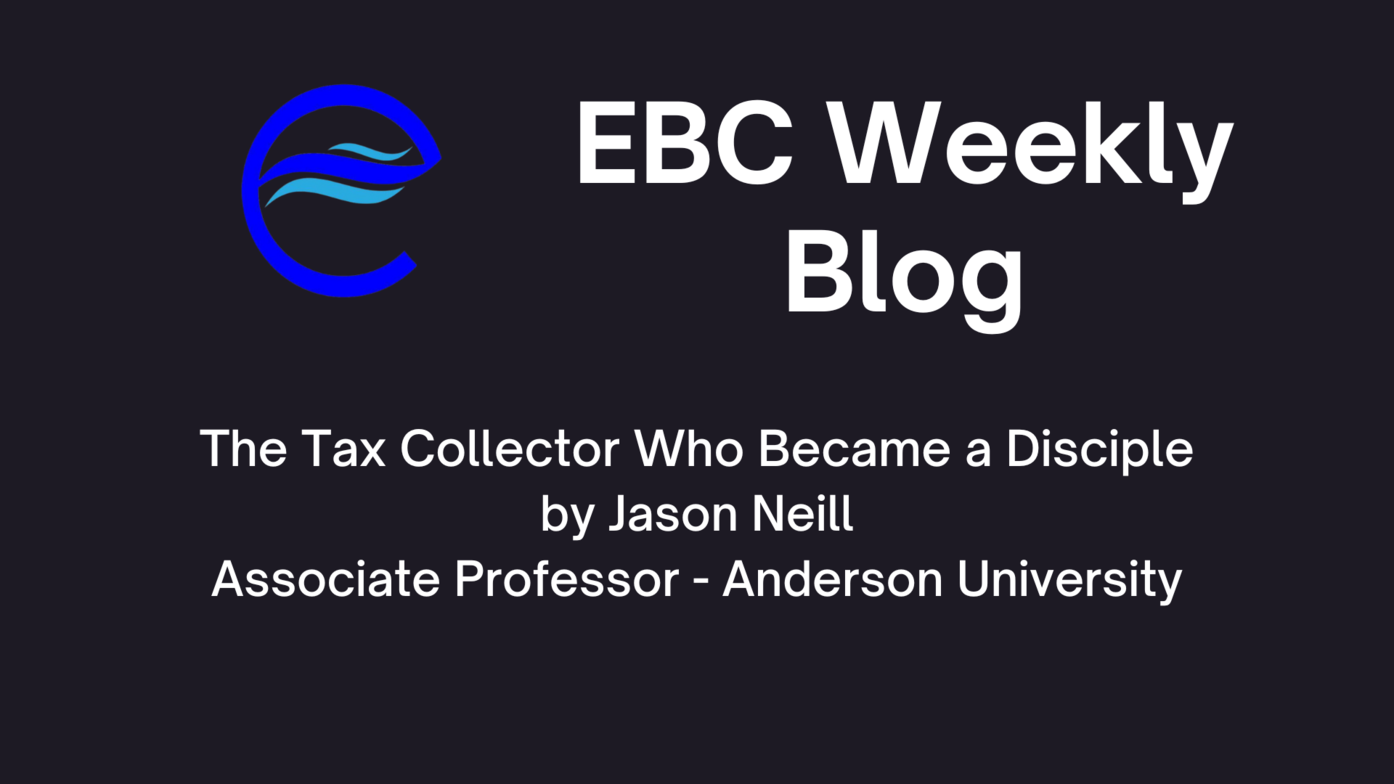The Tax Collector Who Became a Disciple


September 29, 2025
The Tax Collector Who Became a Disciple
by Jason Neill
Scripture reading: Matthew 9
Since we're reading the Gospel According to Matthew this week, it might be helpful to pause and examine the man behind the book. Here's what we know about Matthew from the Biblical data available to us:
- He was one of the original 12 disciples. Matthew, Mark, and Luke all provide a list of the 12 disciples, also known as Apostles, chosen by Jesus (see Matthew 10:1-4; Mark 3:13-19; Luke 6:12-16). Matthew is included in those lists. Another interesting fact about Matthew is that he was not one of the original followers of John the Baptist like John and Andrew (see John 1:35-51).
- He was a tax collector. Tax collectors were despised by the Jewish people for a couple of key reasons:
- Employed by the Roman government, Matthew had a tax office in Capernaum, a city in Galilee, about 85-100 miles North of Jerusalem. Individuals could bid on and purchase the rights to collect taxes. The person who purchased this right would then hire subcontractors to collect the taxes, aiming to collect more than what the original purchase price cost them to make a profit. It is thought that Matthew was one of these subcontractors.
- They were also despised because Jewish tax collectors were considered to have betrayed their religious heritage. This was because they had to interact with Gentiles, who were considered ritually unclean (see Leviticus for more on the difference between being ritually clean and unclean).
- He was working at his tax booth when Jesus called him. While Matthew was carrying out his daily responsibilities, Jesus passed by his tax booth and called him to follow him (see Matthew 9:9-13; Mark 2:13-17; Luke 5:27-32). He immediately left his occupation and followed Jesus, which suggests he likely knew of Jesus before this encounter.
- He was a new follower who celebrated his call. After Jesus called Matthew to follow him, he threw a party at his house and invited all his friends (see Matthew 9:10-13; Mark 2:15-17; Luke 5:29-32). Can you imagine what that scene would have looked like? This would have been considered a “rough” crowd, and Jesus was hanging out with them. I love it! In fact, Matthew’s friends were despised by the religious leaders. We know that because the scriptures say, “And the Pharisees and their scribes grumbled at his disciples, saying, “Why do you eat and drink with tax collectors and sinners?” (Luke 5:30, ESV).
What can we learn from Matthew?
God uses all kinds of people to carry out his purposes, and Matthew is no different. Even though he was despised by the religious leaders, Jesus knew Matthew’s potential to make an impact for the good news of the gospel would be significant. Let’s remember that when we evaluate people by external things. Some of the most well-known characters in the Bible that God used were considered rejects and outcasts by societal standards.
Another lesson we can learn from Matthew is after receiving his call to follow Jesus, he wanted to introduce all his friends to him. There is no evidence Matthew was embarrassed, shy about his decision, or sought to keep his decision to leave his job and follow Jesus a secret. Let’s take a chapter from Matthew’s book, quite literally, and share our love of Jesus with others, even if they are considered outcasts by modern religious standards. The reason we share this message is simple: everyone needs to hear the good news of the gospel.
The Bible tells us that we are all sinners—we've broken God’s laws (Romans 3:23). Think of it this way: if we both tried to throw a rock to the moon, one of us might throw farther than the other, but neither of us would reach it. We would both fall short. In the same way, we all fall short of God's perfect standard. The penalty or wages for sin is death, which means being separated from God now and for all eternity (Romans 6:23). The word "wages" means what you earn. If you worked for someone all day and they paid you $100, that's what you earned. The Bible says that by sinning we have earned death.
But Christ died in our place, as our substitute, taking our sins upon himself (Romans 5:8). Imagine you are in the hospital, dying of cancer. A new medical procedure has been discovered where the cancer cells are taken from your body and placed into my body. I would die, and you would live. I would die in your place. That’s what Christ did for us. He took our sins upon Himself and died in our place.
We can be delivered from the penalty of sin and eternal separation from God by trusting in Jesus Christ alone for the free gift of eternal life, not by our good works, attending church, or any other effort (John 3:16; 5:24; 6:47; Ephesians 2:8-9). To "trust" means to rely on. It’s like trusting a chair to hold you up when you sit down. You don't try to hold yourself up; you simply rest your full weight on it. In the same way, we must fully rely on Jesus Christ alone for the free gift of eternal life. Now, who doesn’t want to tell their friends this kind of good news?
For a clear explanation of the good news of eternal life in video form, watch “The Gospel Explained | May I Ask You A Question?” here: https://www.youtube.com/watch?v=OZvwylOL6L4&t=15s